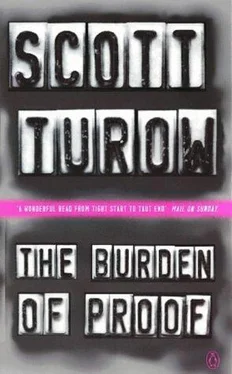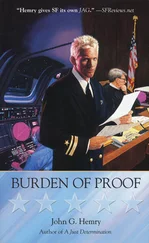Scott Turow - The Burden of Proof
Здесь есть возможность читать онлайн «Scott Turow - The Burden of Proof» весь текст электронной книги совершенно бесплатно (целиком полную версию без сокращений). В некоторых случаях можно слушать аудио, скачать через торрент в формате fb2 и присутствует краткое содержание. Жанр: Детектив, на английском языке. Описание произведения, (предисловие) а так же отзывы посетителей доступны на портале библиотеки ЛибКат.
- Название:The Burden of Proof
- Автор:
- Жанр:
- Год:неизвестен
- ISBN:нет данных
- Рейтинг книги:3 / 5. Голосов: 1
-
Избранное:Добавить в избранное
- Отзывы:
-
Ваша оценка:
- 60
- 1
- 2
- 3
- 4
- 5
The Burden of Proof: краткое содержание, описание и аннотация
Предлагаем к чтению аннотацию, описание, краткое содержание или предисловие (зависит от того, что написал сам автор книги «The Burden of Proof»). Если вы не нашли необходимую информацию о книге — напишите в комментариях, мы постараемся отыскать её.
The Burden of Proof — читать онлайн бесплатно полную книгу (весь текст) целиком
Ниже представлен текст книги, разбитый по страницам. Система сохранения места последней прочитанной страницы, позволяет с удобством читать онлайн бесплатно книгу «The Burden of Proof», без необходимости каждый раз заново искать на чём Вы остановились. Поставьте закладку, и сможете в любой момент перейти на страницу, на которой закончили чтение.
Интервал:
Закладка:
Nonetheless, the inevitable calculations seemed after an interval to take place around the table, and Kate suddenly began to weep. The children could expect to divide among themselves an annual income of about half a million dollars. To this was added a cash bequest to each of $200,000, not to mention the prospect of a good deal more when Stern departed the scene. It occurred to Stern that if he could keep Dixon out of trouble long enough, he would probably be a fitting financial adviser for his nieces and nephew. As to himself, Stern, for reasons he could hardly articulate, felt few compunctions about accepting his wife's gift; perhaps, perversely, because his own estate had grown well past the point where he needed it; or because, after all this, he felt it was his due. By Stern's quick estimate, the residue of the estate left in trust for him-what would remain of Clara's stocks and bonds at the bank-would total about a million dollars.
Going through the details of the trust provision, Cal paused to eye Stern.
"Clara directed specifically that you would remain the beneficiary for life, regardless of any remarriage."
"I see," said Stern.
Cal smiled briefly, delighted by this exacting manag.ement of the future, but the children seemed nonplussed by their mother's forethought-a pulse of discomfort traveled the room. None of them had yet raised this subject with Stern.
No question they had thought of it; everyone had. Even Clara. But it was disconcerting to one and all-to Stern, as wellinto learn that she had formally resolved any objections:
Cal had gone on, but Stern interrupted.
"Is it this trust for me, Cal, that prompted these concerns you raised in the hall?" On reflection, it occurred to him why Cal wanted to speak one-on-one. There might be some conflict btween Clara's desire tprovide for him and the restrictions Henry Mittlet had set, down decades ago. "i'm not concerned, Sandy. I have a question."
"But about this trust for my benefit?"
"More or less. Just give me a moment." Cai dandled a hand; he was too fussy to step out of order. He had been discussing Clara's charitable gifts and he returned to the subject. Kate was crying with fervor. Van Zandt, the bigfirm associate, ever prepared, had come armed with a box of tissue and offered another to Kate, while Cal continued with the details he adored.
"Clara also made a bequest of $500,000 to the Riverside Reformed Congregation, half of which she asked to be used to support the Inner-City Arts Program."
The children took this in, still dazzled by the fountain of money spilling forth, but Stern-who might otherwise have received the funds-found Clara's charity characteristic and commendable. For Stern, the notion of himself as a Jew was an absolute and fixed point of reference, the North Pole, as it were, on has personal compass, against which all other issues of identity were judged. Clara and he shared a belief in the importance of the children's religious education, the observance of the High Holy Days.
But her religion was far more institutionalized than his.
To Clara the synagogue which her maternal grandparents had helped found was a significant anchor, and against all reason she was devoted to the rabbi, a smug self-promoter, and to his many community projects. At Rabbi Weigel's urging, Clara had taught music appreciation as a volunteer for three or four years in the Inner-City Arts Program, an interfaith effort to enhance the curricula of DuSable's most impoverished schools. Clara admired the culture and civility of the well-to-do, but not lheir sense of privilege. She had always been a lerson of conscience.
"That's more or less it." Cal was done. He put down his memo and looked about the table, as if for applause.
"The problem," said Stern, referring once more to the trust Clara had left for him. Cal already seemed to have forgotten.
"Oh," said Cal. "As I say, just one question, Sandy: we've been wondering what became of it."
"It?"
"The money. You understand." Cal leaned forward. "Don't you?
"I had taken it, Cal, from the figures you'd been using that there was another million in the estate." As soon as the words were out he regretted them, particularly the precision with which he seemed to have calculated.
. "Well, not quite," said Cal, mincing as ever. "Clara's holdings haven't made it all the way back from the crash.
But it's the $850,000 that's gone from her investment account I'm talking about."
No one, for a moment, said anything. "Gone?" asked Stern finally.
"Removed," said Cal.
The two men considered each other.
"You're not telling us there has been a defalcation, are you?"
"Lord, no!" Cal turned to Van Zandt, as if for help. "We get a consolidated statement from the bank each quarter on the trusts and Clara's investment account. When we heard the news, we looked, of course, and I saw that this sum had been withdrawn last month. I assumed, Sandy-I was certain she would have discussed {his with you."
Cal paused. "I called."
Stern only now understood.
"You believe Clara spent this money?"
"What else? I took it she'd made an investment on her own, bought a summer home-", Cal's hand trailed off. Marta spoke up.
"What would she do with $850,000? That's bizarre."
Stern, strongly inclined to agree, began to add his voice to Marta's.
But some better instinct saved him. He was-. rising to a treacherous pass. He had no business predicting What was possible or impossible with Clara in these latter days. Perhaps she was funding a hippie sect. on of conscience.
"That's more or less it." Cal was done. He put down his memo and looked about the table, as if for applause.
"The problem," said Stern, referring once more to the trust Clara had left for him. Cal already seemed to have forgotten.
"Oh," said Cal. "As I say, just one question, Sandy: we've been wondering what became of it."
"It?"
"The money. You understand." Cal leaned forward. "Don't you?
"I had taken it, Cal, from the figures you'd been using that there was another million in the estate." As soon as the words were out he regretted them, particularly the precision with which he seemed to have calculated.
. "Well, not quite," said Cal, mincing as ever. "Clara's holdings haven't made it all the way back from the crash.
But it's the $850,000 that's gone from her investment account I'm talking about."
No one, for a moment, said anything. "Gone?" asked Stern finally.
"Removed," said Cal.
The two men considered each other.
"You're not telling us there has been a defalcation, are you?"
"Lord, no!" Cal turned to Van Zandt, as if for help. "We get a consolidated statement from the bank each quarter on the trusts and Clara's investment account. When we heard the news, we looked, of course, and I saw that this sum had been withdrawn last month. I assumed, Sandy-I was certain she would have discussed {his with you."
Cal paused. "I called."
Stern only now understood.
"You believe Clara spent this money?"
"What else? I took it she'd made an investment on her own, bought a summer home-", Cal's hand trailed off. Marta spoke up.
"What would she do with $850,000? That's bizarre."
Stern, strongly inclined to agree, began to add his voice to Marta's.
But some better instinct saved him. He was-. rising to a treacherous pass. He had no business predicting What was possible or impossible with Clara in these latter days. Perhaps she was funding a hippie sect. Or feeding a drug habit.
"Cal, I am not certain I understand how this could have occurred."
"I presume Clara went to the bank, dissolved the great bulk of her portfolio, and took the money. It was hers, after all."
".Have you checked with them?" "Sandy, I wanted to speak with you first. That's why I called." Cal was in excruciating discomfort.
Читать дальшеИнтервал:
Закладка:
Похожие книги на «The Burden of Proof»
Представляем Вашему вниманию похожие книги на «The Burden of Proof» списком для выбора. Мы отобрали схожую по названию и смыслу литературу в надежде предоставить читателям больше вариантов отыскать новые, интересные, ещё непрочитанные произведения.
Обсуждение, отзывы о книге «The Burden of Proof» и просто собственные мнения читателей. Оставьте ваши комментарии, напишите, что Вы думаете о произведении, его смысле или главных героях. Укажите что конкретно понравилось, а что нет, и почему Вы так считаете.












